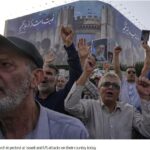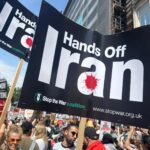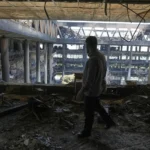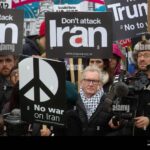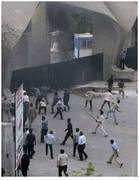
December 10, 2009
Rooz
According to Tehran’s police chief “165 men and 39 women” were arrested in Tehran on December 7. General Azizollah Rajabzadeh did not reveal further details about the whereabouts or conditions of the detainees. He also did not refer to the number of people arrested in other cities. Prior to the Student Day on 16 Azar (December 7), the country’s attorney general had warned the families of those protesting the election result to restrain their children, as the families would not have “the right to be upset” if they are arrested.
Mohseni-Ezhei said, “In the post-election events, the judiciary showed restraint in confronting violators, but will not continue to do that after today.” He also threatened that “Anyone who moves against and disrupts the regime’s order, rights and security will be severely confronted.”
Meanwhile, the public relations division of Tehran’s general and revolutionary courts announced verdicts for 22 individuals arrested after the election. Without naming the individuals, the agency said that 18 of them were sentenced to between 4 months and 4.5 years prison terms, while 4 individuals were acquitted and several received monetary fines and lashes.
On the other hand, Alireza Avaei, head of the Tehran’s court system, announced that the final verdicts of several post-election detainees have been issued, some having been acquitted and some others fined.
He did not explain which individuals were acquitted and which others were fined. In the past days and weeks, Ahmad Zeidabadi, Saeed Leilaz, Hengameh Shahidi, Behzad Nabavi, Masoud Bastani, Mohammad Ali Abtahi and several other politicians and journalists have been dealt strange and hefty sentences.

Last Monday the anniversary of Student Day in Iran led to bloody clashes as anti-riot police fired bullets into air, used teargas and arrested numerous protestors in their efforts to disperse university students in the country.
December 7 is annually celebrated in Iran as Student Day and this year Iranian students held their tribute and protests against the coup administration and the events that followed the June 12 presidential elections as the major universities in Tehran were completely ringed off by security and law enforcement forces who tried to prevent students from leaving the campuses into the surrounding neighborhoods of the capital to join the public by closing the streets that led to the universities.
Through these demonstrations “Death to the Dictator” was the most common cry coming from campuses in Tehran and other academic institutions as the streets around the campuses were the scenes of violent clashes between students and protesting people on one hand and anti-riot agents and plain-clothes agents on the other.
Foreign journalists and reporters were barred from covering the events while there was a serious disruption of access to the Internet and telephone connections, but still many images of the events in Tehran and other cities found their way to the electronic social networks such as uTube and demonstrated the extent of the student demonstrations and the clashes that took place.
Clashes and Arrests in Tehran
As reported by Rooz reporters from Tehran, the streets surrounding all the large universities in Tehran were filled with parked buses used to carry prisoners which were filled with detainees whose heads were covered with bags and who were transferred to undisclosed locations. The neighborhoods around the universities were also witness to scores of plainclothes agents and motorcyclists who participated in the violent clashes and crackdown of the students – which was in fact more violent than the force used by the regular police.
According to these reports, the police fired in the air and used tear gas to disperse students, while arresting tens of protestors as well.
Amid the protests, a large number of students were arrested among whom were Majid Tavakoli who is a member of the Islamic Society of Amir Kabir University and Mohammad Jaafar Tahmasebi a member of the student committee of Mir-Hossein Mousavi.
Zahra Rahnavard Attacked
Zahra Rahnavard, a professor at Tehran University and the wife of Mir-Hossein Mousavi, was physically attacked by a number of women Basijis. Mrs. Rahnavard who is a lecturer at Tehran University’s Fine Arts College was at the university campus and preparing herself for the celebrations commemorating Student Day when she was attacked. One witness said that the attackers initially engaged her verbally and then sprayed pepper gas from a distance of 20 to 25 centimeters onto her face which led to her temporary loss of vision forcing her to gasp for air. Bystanders rushed to her help and rescued her from the scene. Her health has been reported to be in bad condition because of the closeness of the pepper spray that was used on her face.
In the verbal exchange between Mrs. Rahnavard and the attacking women, Rahnavard told them “I am not afraid of anyone except God. Even if you tear me up in pieces you will not hear anything from me other than the green call for freedom and democracy.”
Protests in Other Cities
In addition to Tehran, December 7th was also commemorated in other towns in Iran as strict security measures were implemented as an effort for the security forces to prevent students from joining protesting people. Reports indicate that large groups of security and law enforcement agents, including plainclothes agents gathered most universities on Monday. The cities were such protests were held included Tabriz, Rasht, Isfahan, Hamedan, Shiraz, Semnan, Kermanshah, Babol, Mashhad, Kerman, Najafabad, and others. In their continuing protests, these students demonstrated against the coup elections and the post election events in Iran. In these demonstrations, which led to violent clashes, many students were arrested and taken away by security forces.
What stood out in these events on Monday was that many of the slogans that were chanted were directly directed at ayatollah Khamenei and students fearlessly chanted them in the presence of the security forces around them. The scope and intensity of these student protests in the capital was so large that observers said they were unprecedented for this occasion.







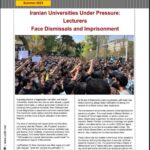





 Posted in
Posted in 
